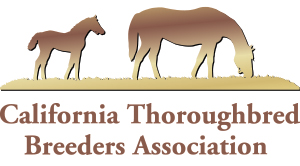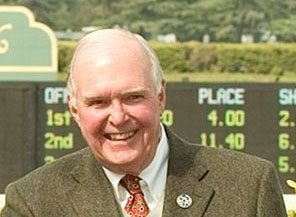By California Thoroughbred
Many individuals were involved with the creation of California Cup in 1990, leading to increased opportunities for California-bred runners. At the California Thoroughbred Breeders Association, Lou Rowan and Don Valpredo spearheaded efforts to create such a program.
The Oak Tree Racing Association quickly signed on, led by its board and then-general manager Ray Rogers. Sherwood “Chilly” Chillingworth had come onto the Oak Tree board in 1989 and became its executive vice president in 1993. His efforts to promote California Cup in subsequent years have immeasurably helped the state’s breeding industry and make him a worthy addition to the Hall of Fame.
When California Cup celebrated its 25th running in 2015, Chillingworth recalled those early years.
“Oak Tree was bred to be helpful to the industry, and we thought this was a fine idea,” he said. “But we had to write new legislation and alter our stakes schedule. It wasn’t an easy thing to do. Oak Tree put up a lot of the money to make it happen, but the idea was to interest people in breeding and buying Cal-breds. I think the Cal-breds have gotten better over the years because of this.”
California Cup was only one area in which Chillingworth and Oak Tree benefitted the racing and breeding industries, both at the state level and nationally. As just one example, the Oak Tree at Santa Anita meeting hosted the Breeders’ Cup five times.
“Chilly was right in the middle of each of those events,” said John Barr.
Barr, who sits on the CTBA board and was inducted into the Hall of Fame last year, should know. He served with Chillingworth on the Oak Tree board.
“We became good friends over the years,” Barr said. “It was through Chilly’s efforts at Oak Tree that the Cal Cup collaboration took place, and the two organizations presented the Cal Cup event at Santa Anita for many, many years.”
Oak Tree also donated millions of dollars to a variety of racing-related causes, from veterinary research and horsemen’s welfare groups to seed money to start such organizations as the National Thoroughbred Racing Association and the Racing Medication and Testing Corsortium.
“All profits (from Oak Tree) were for the ongoing benefit of horse-racing charitable events and aid,” said Barr.
Chillingworth also enthusiastically participated in the racing industry. He co-owned such stakes winners as Swing Till Dawn, Yashgan, Forzando, and Valley Victory. British import Yashgan earned $516,920 and, perhaps foreshadowing Chillingworth’s involvement with Oak Tree, he won the 1985 Oak Tree Invitational (G1T).
Chillingworth brought his considerable legal background to both his professional career with the Richfield Oil Company and in real estate development and to his service to the industry.
In addition to his work with Oak Tree, Chillingworth served as a steward of The Jockey Club, secretary of the board of the Thoroughbred Racing Associations, director of the Thoroughbred Racing and Protective Bureau, and member of the Equibase Management Committee.
But it is as the face of Oak Tree that Chillingworth is best known in Thoroughbred circles. He oversaw Oak Tree until his death this past October.
“He will be missed, but he has left a special legacy,” said Barr.
Even though California lost Lucky Pulpit in early 2017, it is the nature of sires that the breeding industry continues to reap their benefits after they are gone. Lucky Pulpit’s offspring are still running well, keeping his name prominent on California’s sire lists.
Fashionably Fast is a good example. Foaled in 2015, that son of Lucky Pulpit came into his own in 2019, when he captured back-to-back stakes: the Harris Farms Stakes at Fresno and the Cary Grant Stakes at Del Mar.
John Harris’ Harris Farms, for which the Fresno stakes is named, bred Fashionably Fast and co-owns him. Lucky Pulpit stood his entire career at Harris Farms in Coalinga, and he comes from the breeding program of Larry and Marianne Williams.
The California breeding industry owes the Williamses a debt of gratitude because they produced the Kentucky-bred horse, raced him through most of his career in California, and stood him in the state.
A son of Pulpit—Lucky Soph, by Cozzene, Lucky Pulpit began racing at 2 in 2003. He broke his maiden in his second start and placed in two stakes that season.
He became a stakes winner in 2005 when he won the Smile Stakes at Arlington Park, and he was often a factor in stakes competition, placing in six stakes, including the 2004 Santa Catalina Stakes (G2) on dirt and the Generous Stakes (G3T) on turf. In 22 starts, he won three races, with five seconds and five thirds for earnings of $209,928.
Lucky Pulpit surpassed himself at stud. A perennial leading California sire, he has been honored at several CTBA awards banquets. Most recently, he received awards as the 2018 leading California sire of California-conceived 2-year-olds by earnings, 2016 leading California sire of Cal-conceived foals by earnings, and leading California sire of Cal-conceived foals by number of winners in 2016, 2017, and 2018.
These exploits alone make Lucky Pulpit a fine addition to the Hall of Fame. But he became nationally known when California Chrome reached the races. Like his sire, California Chrome was a fast, flashy chestnut. Foaled at Harris Farms, California Chrome was bred and raced by Perry Martin and Steve Coburn.
California Chrome’s story has been oft told in these pages, as he became one of the most popular runners in recent times.
An earner of $14,752,650, he won two-thirds of the Triple Crown, the Dubai World Cup, and the hearts of millions.
Twice the Eclipse Award-winning Horse of the Year, California Chrome racked up state-bred trophies as well, including two Cal-bred Horse of the Year titles.
With his first foals 2-year-olds of 2020, California Chrome has not yet begun to prove his prowess as a sire nor add to Lucky Pulpit as a sire of sires. California Chrome’s third crop will arrive in 2020, and he was recently sold to Japan to continue his career there.
Lucky Pulpit’s sire career goes much further than California Chrome. He also sired multiple stakes winner Rousing Sermon, bred and raced by the Williamses. Rousing Sermon earned $821,572 and won the 2011 Bob Benoit California Cup Juvenile Stakes and the 2013 On Trust Handicap.
Rousing Sermon’s first foals are 2-year-olds of 2019 and include Williams-bred winner Arouse n Go. Other runners by Lucky Pulpit include multiple stakes winners Luckarack (an earner of $634,552), Floating Feather ($377,884), Pulpit Rider ($377,159), and Bookies Luck ($216,994).


